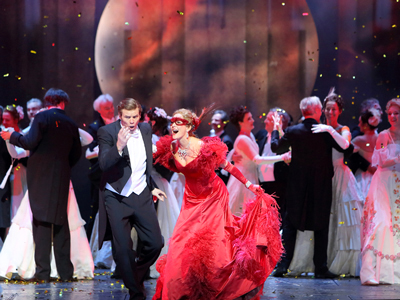
By ANDREW POWELL
Published: January 31, 2016
MUNICH — Three years ago Bavarian State Opera’s yearly Silvester performances of Die Fledermaus came to a sudden, poorly excused halt. Never mind that they were a global signature of the company; Carlos Kleiber famously led ten of them. As substitutes, the powers-that-be provided La traviata (Verdi was 200) and then, weirdly, L’elisir d’amore. But last month the bat returned, courtesy of GMD Kirill Petrenko, who, it turns out, is as much a fan as Kleiber and a tautly disciplined but supple musical advocate. Indeed he conducted gleefully Dec. 31 and Jan. 4 yet with his customary, at times martial, intensity, the carotid arteries alarmingly discernible — which did not preclude ballerina-like poses, hands high, fingers pointed together, for stylish delays in Johann Strauss’s three-four time. The orchestra sizzled. The chorus sang with astonishing precision and expressive warmth, not least for Brüderlein, Brüderlein und Schwesterlein. Oozing charm and impeccable in their comic timing as the Eisensteins were Marlis Petersen and Bo Skovhus. She sang, also danced, a seductive table-top Klänge der Heimat, ending on the eighth-note high D, as written, although less than forte. Anna Prohaska brought moxie and what may have been a fine Lower Austrian drawl, not much volume, as the “Unschuld vom Lande.” Edgaras Montvidas contributed an ardent, grainy-sounding Alfred, Michael Nagy a mellifluous Falke, mezzo Michaela Selinger a game but too-bright-sounding Orlofsky; her party guest, Thomas Hampson, in town to prepare for Miroslav Srnka’s costly new opera South Pole, interpolated a lavish Auch ich war einst ein feiner Csárdáskavalier … Komm, Zigan, spiel mir was vor. Missing, alas, was the magnetic Alfred Kuhn, long a definitive, droll Gefängnisdirektor Frank here (also Antonio the gardener and Benoît the landlord); in context, Christian Rieger looked and sounded awkwardly robust. Andreas Weirich’s rethinking of the old Leander Haußmann production worked best in Acts I and II. The cramped jail action sputtered, and Viennese actor Cornelius Obonya, a Salzburg Jedermann, went on too long as Frosch; he will be replaced this coming New Year’s Eve by a Bavarian.
Photo © Wilfried Hösl
Related posts:
Petrenko’s Rosenkavalier
Verdi’s Lady Netrebko
See-Through Lulu
Petrenko’s Sharper Boris
Manon, Let’s Go
Tags: Andreas Weirich, Anna Prohaska, Bavarian State Opera, Bavarian State Orchestra, Bayerische Staatsoper, Bayerischer Staatsopernchor, Bayerisches Staatsorchester, Bo Skovhus, Carlos Kleiber, Christian Rieger, Cornelius Obonya, Die Fledermaus, Edgaras Montvidas, Johann Strauß, Kirill Petrenko, Marlis Petersen, Michael Nagy, Michaela Selinger, München, Munich, Review, Thomas Hampson